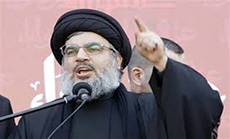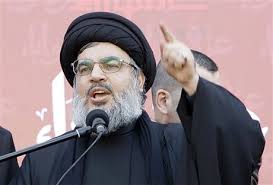Sayyed Nasrallah Breaks Rules of Engagement...with Wisdom

Sami Kleib - al-Akhbar newspaper
January 30, 2015 made history. It was a new watershed in the speech of Hizbullah leader, Sayyed Hassan Nasrallah. What the party's Secretary General said, during the commemoration of Quneitra Martyrs, and the title "On the Road to al-Quds," simply means the unification of the front from the Golan to southern Lebanon until Palestine. It also meant the underpinning of a new strategy that would torpedo the borders of the former geography.
 As of January 30, the previous strategy that entailed limiting the fight with "Israel" within the Lebanese soil, ended. This means a quality development in both the rhetoric and the planning; a development that has perhaps laid off the former restrictions.
As of January 30, the previous strategy that entailed limiting the fight with "Israel" within the Lebanese soil, ended. This means a quality development in both the rhetoric and the planning; a development that has perhaps laid off the former restrictions.
To better understand the aforementioned, let us remark the following:
The intended "On the Road to al-Quds" motto, leveled next to the photos of Quneitra martyrs, simply means that Hizbullah has placed the martyrdom of its fighters and of the Iranian General within the context of the comprehensive conflict with "Israel." Moreover, Sayyed Nasrallah spoke abundantly about Palestine, the struggle of the Palestinians, and "Israel's" oppression.
Sayyed Nasrallah's utter refusal of the rules of engagement and his confirmation that the party was ready to go beyond all expectations, practically called off the unannounced restrictions which used to entail that Hizbullah was contended with balanced reactions to the "Israeli" aggressions and within a limited geography.
Furthermore, his confirmation that facing the enemy "will be in any place, at any time, anyhow," not only does it eliminate the borders set by Sykes-Picot among Lebanon, Syria and Palestine; but it also broaches the possibility of countering "Israel" at nay place in the world. Thus, ever since that speech, the "Israeli" interests became a legitimate target for the party's fighters in any geography.
In addition, his warning that retaliation at the assassination of any Hizbullah official will take place in any place, at any time, and that "Israel" shall bear its responsibility, paves the way for widening the scope of the rules of engagement and to find permanent justifications to counter "Israel" in a place and a at a time to be determined by the Resistance. But it is clear that what is meant is to deter "Israel" from assassination at this critical stage.
All the aforesaid clearly means that Hizbullah moved to a new phase in the conflict with "Israel," and that Syria and Palestine have become within the party's new fighting geography, which practically means the unification of this front. Perhaps the presence of the Chairman of the National Security and Foreign Policy Committee at the Iranian Shoura Council, Alaeddin Boroujerdi, in the ceremony to commemorate Quneitra martyrs, gives Sayyed Nasrallah's speech a dimension that is beyond Palestine and Syria, officially including Iran now.
Still, Sayyed Nasrallah clearly maintained that he did not want war, but that he did not fear it either, meaning that he will retaliate to "Israel" in the event of any attack, but that he will not be the first to open fronts.
It is undoubted that the party which is now allying in blood with the Syrian army in Syria and backed by Iran, has been already practicing the concept of the front's unification on the ground; yet this time, it is official; it is nay a commitment by Sayyed Nasrallah to fighting inside Palestine or the Golan if need be.
This is a major development that will certainly put "Israel" and its allies in front of a new reality. It is to note that Hizbullah has quickly taken revenge for Quneitra martyrs. Nonetheless, the party still keeps to itself the place and time to retaliate to the assassination of its top official Imad Mughnieh.
When Sayyed Nasrallah said that the revenge for Quneitra martyrs took place similarly to the operation executed by "Israel," he perhaps meant, deep inside, that countering the killing of Hajj Imad Mughnieh would be up to the liquidation of a senior "Israeli" official who might be just as important.
Since January 30, the entire region has been in front of a new aspect of the conflict.
This is exactly what the terror balance is about, which will continue to constitute a factor of stability, as long as it concerns "Israel" and Lebanese sides wishing to strip the party from its arms, because "Israel" knows that Sayyyed Nasrallah just does not joke around. Will it then defy him?




